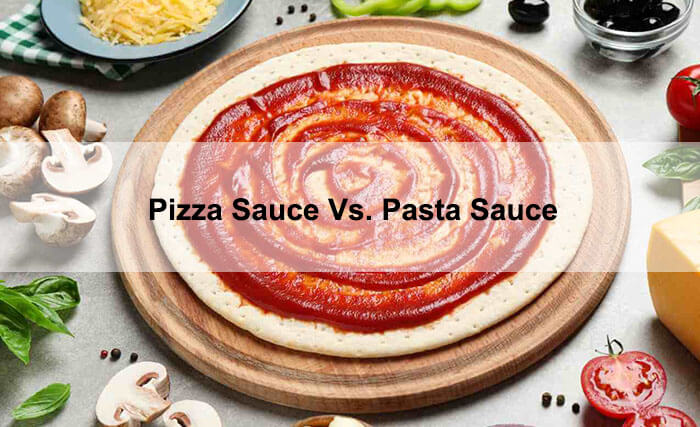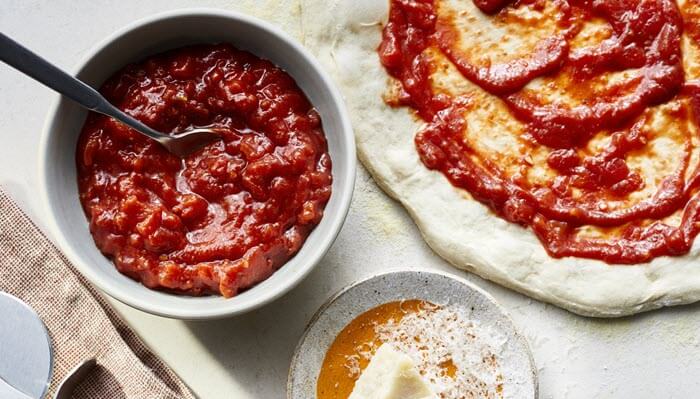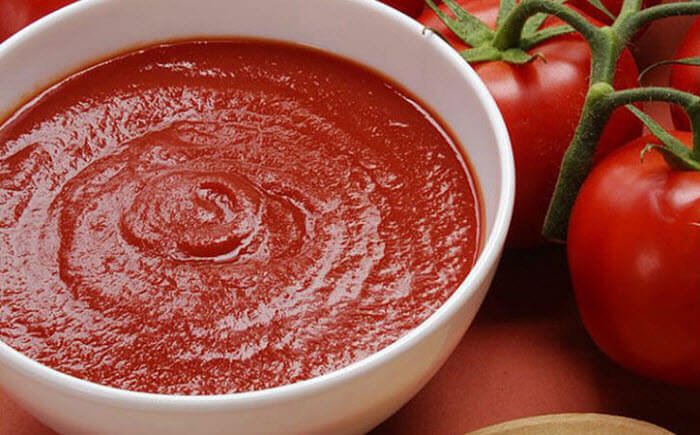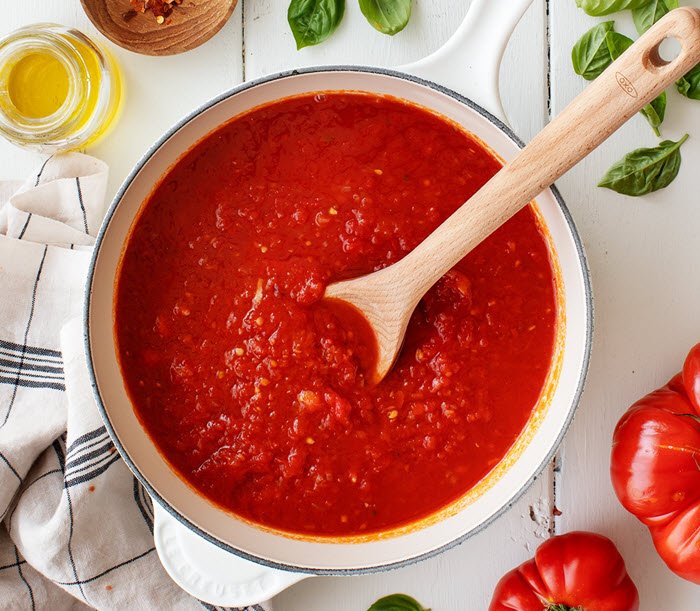Many, if not all, pizzas made in my house have been slathered with a pasta sauce I had sitting in my cupboard.
But it turns out I’ve been sorely mistaken about this substitution for years. To my surprise, pasta sauce is not the same as pizza sauce, and the difference is more significant than you think.
Now you may be wondering: is pasta sauce the same as pizza sauce?
To increase your knowledge of the classic college dinners of pizza and pasta, I’ll break down the differences and similarities between the sauces. So next time you reach for the marinara, you’ll know if you’re doing the right thing.
Table Of Contents
Pizza Sauce Vs. Pasta Sauce: What Are They
What is Pizza Sauce?
Pizza sauce, or tomato sauce as it is more commonly known outside the United States, is a mixture of tomatoes and different ingredients such as onion and garlic. The ingredients can vary in its preparation depending on regional differences and cooking styles.
- Bonus: If you’re interested in finding the best pizza sauce, here is an in-depth review for you.
The consistency of pizza sauce also varies from region to region with some places favoring a thinner and runnier version while others preferring a thick and chunky sauce or a paste.
Pizza sauce is commercially manufactured and available in cans as well as being prepared at home from fresh tomatoes, canned tomatoes, tomato puree, tomato paste, minced garlic, and whatever other ingredients the cook has on hand.
In some places, pizza sweetened with sugar is also available. It is also possible to purchase ready-made pizza sauce at some supermarkets and grocery stores.
Further reading: What Can You Substitute for Pizza Sauce
What is Pasta Sauce?
Pasta sauce is a thick, chunky condiment usually made from tomatoes, herbs, and spices. It’s used to flavor pasta or other types of noodles.
Pasta sauce was first used as a topping on pasta. But it wasn’t until the 19th century that people started mixing it with pasta and cooking it together.
It is also popular as a dipping sauce for various types of bread and French fries.
So, after introducing the two sauces, is pasta sauce the same as pizza sauce?
Pizza Sauce Vs. Pasta Sauce: Similarities
Many assume pizza sauce and pasta are the same. Don’t beat yourself up too much if you’ve been making the same mistake as I have.
After all, pizza sauce vs. pasta sauce crossover in a lot of their ingredients. The obvious one here is that they are both made of tomatoes that have been made into a sauce or paste.
Both pasta sauce and pizza sauce combine tomatoes with herbs like oregano, parsley, basil, thyme, rosemary, or marjoram. The real difference between these sauces is in the preparation. But if you have these ingredients, both pasta sauce and pizza sauce are within your grasp.
Pizza Sauce Vs. Pasta Sauce: Differences
So the similarities between pasta sauce and pizza sauce have been covered. But what is the difference between pizza sauce and pasta sauce?
Preparation
As mentioned, the preparation of these two sauces is the main aspect that separates them in the culinary world.
Pasta sauce simmers in a pot, so all the spices blend together, and the tomatoes cook down. The cooked pasta sauce combines with the already-cooked pasta. And, voila, you have a yummy pasta dish!
Pizza sauce is not cooked. That is the important information to take away here. Pizza sauce is a puree of raw tomatoes closer to a tomato pasta than a pasta sauce. It cooks in the oven along with the pizza, rather than beforehand.
Ingredients
Both sauces are made from tomatoes, so the only difference between pasta sauce and pizza sauce ingredients is the necessity of the seasoning.
Because pizza sauce is topped with cheese and other toppings, there isn’t a need to season the sauce by itself.
Many chefs also season the pizza on top so the top layer of the pizza, the portion you taste the most, is well-seasoned. But pasta, unless it’s lasagna, is not a layered dish. So you want the seasoning dispersed throughout the sauce that will coat the pasta.
An unseasoned pasta sauce will make for a very disappointing pasta dish. Even more important is that the seasoning is simmered thoroughly with the tomatoes. Cooking ensures the tomato sauce absorbs the flavors, so it isn’t bland.
Consistency
Pasta sauce is typically thinner, so it can coat the pasta better. Pizza sauce is thicker, so provide a sturdy bed for the pizza topping and not become watery in the oven. The thicker sauce stands up better in the oven, so it won’t become loose.
The consistency of the two sauces is an important difference when it comes to the final dish. The looser pasta sauce works well to use the pasta as a vessel, especially for long pasta like spaghetti or fettuccine.
Using a loose pasta sauce on pizza can result in a soggy crust without a decent bed of sauce. The last thing anyone wants instead of a pizza is a sauceless pizza crust with cheese on it.
Related Questions About Pizza and Pasta Sauce
Is marinara sauce a pasta sauce?
Marinara sauce is a specific kind of pasta sauce that is usually made from crushed tomatoes and stewed in herbs and oil. It is the simplest of pasta sauces, and many Italian sauces are just marinara with added ingredients and slight variances.
As far as pasta sauces go, marinara is one of the simplest and only takes a few ingredients to come together.
The addition of meat makes it a bolognese, the introduction of anchovies makes it a puttanesca, and Mezza Mezza sauce is marinara mixed with alfredo. Marinara is essentially the base of all Italian red pasta sauces.
Can I use pizza sauce for pasta?
I do not recommend this. If you are desperate and in a pinch and aren’t too particular, you may get away with it.
But the sauce will probably be too thick for the pasta to hold, and the flavor may be overpowering against the pasta.
Can I turn pizza sauce into pasta sauce?
It may seem to make sense that if pizza is uncooked tomato puree, and pasta sauce is cooked tomato puree, you could cook pizza sauce to make it into pasta sauce. However, this is not the case.
To achieve the correct flavor and consistency for pasta sauce, the tomatoes need to cook before pureeing. Cooking allows the herbs to meld into the tomato flavor. The whole tomatoes add juice to the sauce, so it is not too thick.
Can I cook pizza sauce?
If you still want to cook your pizza sauce, or you are following a recipe that says to, you can do so. But the results may not be as good as if you leave the tomatoes raw.
The raw tomato puree is thicker and adds a zesty, flavorful sauce to the pizza, whereas pasta sauce is a more subdued flavor.
You May Like: Marinara vs Spaghetti Sauce, What is the Difference?
To Wrap Up
So next time you are grocery shopping, consider grabbing the pizza sauce to be accurate in your sauce use. Or make it yourself!
Now you know pizza sauce does not require additional cooking, but just a decent blender and some tomatoes. And anyone that has ever made their own pasta sauces, knows the jars could never compete.
If you are hankering for a classic pizza, but all you have in your cabinet is marinara, don’t let yourself go hungry. Although the marinara may not be ideal, the sauces are similar enough that there is no need for you to go without your weeknight pizza.




